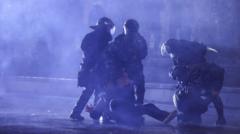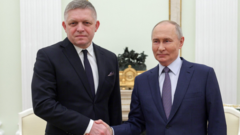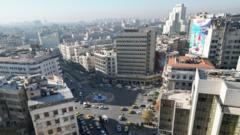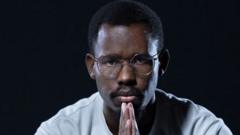Protests against the Georgian government's suspension of EU talks are intensifying, leading to over 300 arrests and numerous allegations of police brutality. While the government deflects blame onto opposition leaders, reports of violence suffered by protesters raise alarms about the state of civil liberties in Georgia.
Rising Tensions in Georgia Amid Pro-EU Protests Raise Concerns of Police Brutality

Rising Tensions in Georgia Amid Pro-EU Protests Raise Concerns of Police Brutality
As protests erupt in Georgia over stalled EU membership talks, over 300 arrests and allegations of police violence illuminate a growing civil unrest.
The streets of Tbilisi have transformed into a battleground as protests against the Georgian government’s decision to halt talks on EU membership escalate. Over six nights, tens of thousands have rallied outside parliament, leading to more than 300 arrests. Eyewitness accounts detail alarming acts of police violence, with protesters reportedly facing brutal beatings and, in some cases, torture.
Among those affected is Avandtil Kuchava, 28, who recounted a horrific encounter with police that left him severely injured. His story reflects a broader sentiment of fear and anger as many protesters feel targeted by law enforcement while demanding a European future for Georgia, rather than a return to Russian influence.
The unrest erupted following a declaration from Prime Minister Irakli Kobakhidze’s ruling party, Georgian Dream, which announced it would cease further negotiations with the EU. This fuelled accusations that the government is backtracking on democratic principles, stoking a climate of distrust among the populace.
Human rights advocates, including Georgia's ombudsman and international figures such as UN rights chief Volker Türk, have condemned the police's harsh tactics as "unnecessary or disproportionate." These statements come amid claims by the ruling party that opposition figures are inciting the violence, which critics argue plays into a broader narrative of political repression.
Emerging videos from the protests document the ferocity of the police response, including the use of water cannons and tear gas against defiant protesters. Among the notable scenes was Nana Tomaradze, whose fierce confrontation with police captured social media's attention before she was taken into custody. Many worry about her fate, as she has an 11-year-old son awaiting her return.
Accusations against law enforcement are mounting, with reports of severe injuries including instances where protesters were violently assaulted even after falling unconscious. Despite the government's claims of violence from protestors, observers note the disproportionate force used against civilians displays a concerning trend towards authoritarian governance.
The protests, grounded in a desire for alignment with Western values, have been defined as a critical moment for Georgia. Activists like Mari Kapadnadze express a belief that the struggle extends beyond national borders, framing it as a contest between Russian dominance and European aspirations.
As pressure from the protests continues, international scrutiny increases, with embassies reminding the Georgian government of its responsibility to the citizens and re-evaluating its strategic partnerships in the face of rising authoritarianism. The unresolved grievances surrounding electoral issues, citizens' rights, and the government’s international commitments will likely keep the tensions on the streets of Georgia alive in the coming days.




















